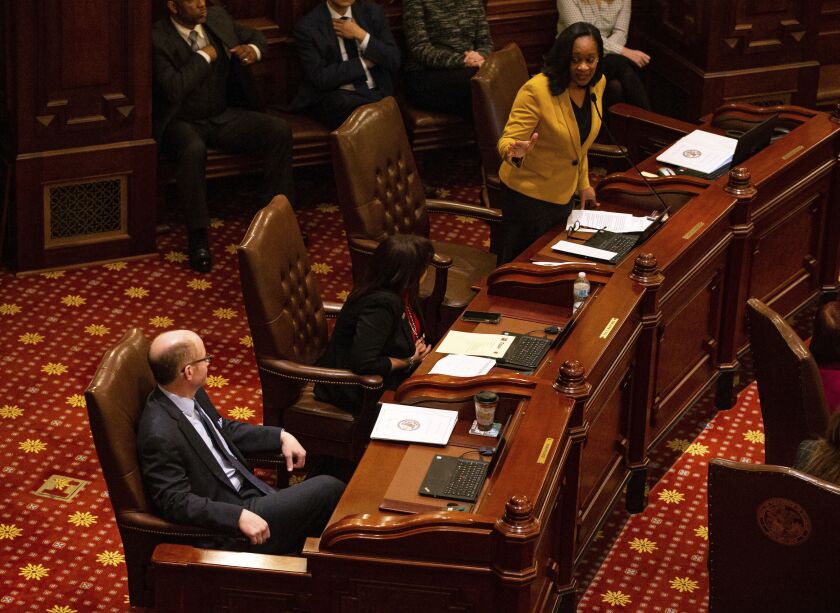SPRINGFIELD — The right of Illinois workers to “organize and to bargain collectively” could soon be codified into the state’s constitution, and the terminally ill could soon secure early release from prison more quickly under measures that passed through the General Assembly Wednesday.
The House took up a constitutional amendment to the state’s Bill of Rights that says Illinois workers “shall have the fundamental right to organize and to bargain collectively ... for the purpose of negotiating wages, hours, and working conditions.”
The amendment would also ensure the right to bargain will not be “diminished” by any future law, proponents said.
State Rep. Marcus Evans, the sponsor of the amendment, said it would not change existing Illinois law but “make permanent” the rights workers already have.
“The message to everyone across this country and across the state is that their workers want to be prioritized,” the Chicago Democrat said.
State Rep. Lance Yednock, D-Ottawa, pointed to states that have right-to-work laws, saying they’re “one of the most diabolical ways to limit collective bargaining” and limiting bargaining is a “losing proposition for all workers,” Yednock said.
But state Rep. Deanne Mazzochi, R-Elmhurst, called the language of the amendment “problematic,” saying that the actual meaning of the provision might be left up to the Illinois Supreme Court.
“Once you enshrine this at the constitutional level, any change is going to be very difficult to reverse,’’ Mazzochi said. “This on its face seems like a really nice idea … but we’ll be dealing with the negative fallout of an ill thought-out constitutional provision.”
The proposed constitutional amendment passed 80 to 30. Already approved by the state Senate, it will go before voters, appearing on Illinois’ ballot in 2022.
The Senate passed a bill that could allow terminally ill prisoners to be freed more quickly by the Prisoner Review Board. Under current law, terminally ill or mentally incapacitated prisoners who wish to be released to the care of family in their final days must rely on a commutation from the governor.
But there’s “no mechanism in Illinois to permit us to do that,” said the bill’s sponsor, state Sen. John Connor, D-Lockport.
The bill “provides reasonable timeframes and deadlines for the Prisoner Review Board to review cases involving medical incapacity or terminal illness, and to determine if those inmates — with victim input — would basically … have a quality-of-life improvement if they’re moved out of prison,” Connor said.
Terminally ill incarcerated people would only be eligible if they have family able to care for them and are expected to die within 18 months, O’Connor said, adding the new measure would be used “when being imprisoned doesn’t make a difference anymore.”
But state Sen. Terri Bryant pointed to cases in the state’s Department of Corrections where physicians said someone would imminently die “over and over and over again.”
“There were physicians that would tell us that a particular incarcerated individual was going to pass very soon and then, two, three years later the person is still living,” said the Murphysboro Republican.
State Sen. Steve McClure, R-Springfield, said allowing many of these inmates to be released would be unfair to the victims who cannot speak for themselves.
“I’m sure that those victims would love to have two to three more years with their families, except for the fact that they’re all dead,” McClure said. “They don’t they didn’t get that opportunity.”
The bill passed 34 to 17 and now heads to the governor’s desk.
A bill that would create an elected school board in Chicago advanced out of a Senate committee Wednesday on an 11 to 6 vote, clearing the way for that legislation to pass through the full chamber. But legislators agreed to hold the measure as they work on a compromise.
State Sen. Robert Martwick, D-Chicago, urged his colleagues on the Senate Executive Committee Wednesday to pass the bill so legislators have “vehicles” for that potential compromise, but warned that he wouldn’t let those negotiations stand in the way of the city getting an elected school board.
“I want it [to be] clear that while I will continue to negotiate in good faith till the 11th hour of this General Assembly, I will not go quietly without passing something for an elected school board this year,” said the Northwest Side Democrat, who is a sponsor of another elected school board measure.
Before the committee voted, state Senate Majority Leader Kimberly Lightford said the House bill — as well as the one she’s sponsoring on behalf of Mayor Lori Lightfoot — still needs work. She urged her colleagues to find a compromise that “gets to what our children in the classroom need.”
After some back and forth on the bill between Lightford and Martwick, state Senate President Don Harmon, D-Oak Park, jumped in and told legislators he’s “confident” that the General Assembly will pass a compromise before its scheduled Monday adjournment.
Andrew Sullender reported from Springfield, Rachel Hinton from Chicago.
Editor’s Note: The print copy and a previous online version of this report contained incorrect information about the status of the constitutional amendment. This report has been corrected to indicate that the state Senate had already passed the amendment.









